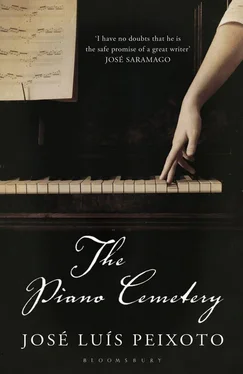‘Grandad is loveliest of the world.’ I took her in my arms and went to the patio door. Marta was still living in the house near the workshop. She had a straw hat on her head and she was sitting with Francisco on the bottom step. They were eating oranges and talking. In front of them, wagging its tail, was a dog. I went down the stairs, and as I approached them Elisa was playing with my ear. I put her down on the ground and she began to run around on the pine shavings. I stayed a bit to make the most of the cool. I peeled an orange. We talked about something that was more or less important at that moment. But that was a long time ago. The sky was loveliest of the world.
I’d just arrived back from the workshop. The gentle voices of my children were gliding. As I dried myself with the towel that was hanging in the washroom, Francisco ran around my legs. It was the last moment of lightness. Someone knocked unhurriedly at the door. From that moment the light began to transform into the shadow that was the colour of the sky and the streets, the shadow which would turn black and come in through the night. I had already arrived back from the workshop. I opened the door.
The wrinkled, distressed face of a woman looking at me from down there, who hadn’t yet come up to the front step. She looked away. She looked at me again. She asked if this was where my wife lived. She said my wife’s name. She said the name, solid but light, white, a single white shape; the unpronounceable name which exists, but which is impossible, because it is a name whose meaning is from a time before there were words, the first name, like a spot in the universe that’s still empty, waiting to be filled up with life, illusions, possibilities.
Francisco, small, shy, leaned silently on the half-open door, watching the woman with his huge child’s eyes. My wife walked alone to the door and for a frozen moment she was frightened, her lips had no words, the palms of her hands on her skirt. She told the woman to come in. Marta, Maria and Simão fell silent when she entered. Francisco ran into my arms.
The two of them sat at the table. Dimly lit. The woman chose the words and the moment to say them. She chose the voice to say them with — serious, firm. They weren’t merely words. My wife’s godmother, who’d had a boarding house, glasses, who opened the door to me that first time I saw my wife, who closed the doors and the windows when my wife told her she was going to have a child, who’d brought her up since she was small, had died.
That night, there was nothing for us to do but sit at the kitchen table, after putting our children to bed, me listening, my wife telling all the stories she remembered about her godmother, about how she was sometimes tender, how she always laughed at the same jokes, how she invented enemies from among the women who lived next door, how she treated the plants in their pots, how austere she was and innocent. I know what my wife was thinking that night before she went to sleep.
In the morning, dressed in black, she went into the morgue accompanied by the gentleman from the undertaker’s. At the end of the morning she opened the door to the chapel while the priest and the gentleman from the undertaker’s talked next to the coffin. She sat in a chair, her hands between her knees, and spent the whole afternoon looking at the same spot, and she was there the whole evening, the whole night. At the same time, at home, I was trying to tell Francisco not to make so much noise and filling Maria’s plate, and Simão’s, and using a gruff voice to tell them to eat it all up, and playing with them, and stopping playing with them, and saying to them:
‘It’s time for bed.’
The nieces of the woman who had raised her only arrived the following morning. They passed through the incandescent light that flooded the open door to the chapel. They had black jackets over their shoulders, they were tired, pulling their husbands’ arms.
Tuesday went by, with nothing happening. She darned socks. She took off Íris’s bandage. The man from the butcher’s talked to my wife about Francisco. He told her he was certain that next Sunday there was no doubt about it, Francisco would win for sure.
‘Oh, that would be good,’ said my wife.
‘For sure!’
‘Well, it would be good.’
‘For sure!’ the man repeated.
Wednesday went by, with nothing happening. My wife was almost about to telephone Francisco’s wife. The morning came to an end, but it wasn’t yet the time Maria arrived for lunch. My wife was almost not going to wait for Maria, almost not going to ask her if she could make a telephone call. She would have to tell her afterwards. As soon as she arrived, she’d tell her. But right then she couldn’t wait. She had to know if there was any news from Francisco. But she didn’t want to give our daughter the satisfaction of letting her know that she’d made a call without asking. The last time they’d argued about this, my wife had sworn to herself that never again, never again would she use the telephone without asking first, a proud woman. But she had to know if there was any news from Francisco. Something inside was telling her, something inside was telling her. She couldn’t wait. But it wasn’t long until Maria’s lunchtime. But it was still a bit of time. But she didn’t want to give her the satisfaction. But. But. She was thinking these thoughts when the telephone rang. My wife took a breath, answered, and wasn’t surprised to find it was Francisco’s wife, talking quietly and telling her that everything was all right.
‘But is he liking Sweden?’
‘He didn’t say.’
‘Is it cold or hot there?’
‘He didn’t say.’
‘Do you think he might need a jacket?’
‘He just said that everything was all right.’
Francisco’s wife didn’t even begin to answer my wife’s questions. Slowly, with each phrase, as though making her way down a staircase of phrases, my wife began to give up. At the same time she could imagine that perhaps Francisco’s wife had become accustomed to using that lifeless tone, that voice, when she still worked at the hospital, when she walked the nurses’ corridors pushing trolleys of trays or holding a capsule between her fingers. Having given up on asking about Francisco, my mother asked her about the pregnancy.
‘I’m getting on.’
It wasn’t worth asking anything else. They said goodbye. When Maria arrived for lunch, my mother recounted the entire telephone call with Francisco’s wife. When Maria arrived home at the end of the afternoon, before they sat down for dinner, she told her again.
It was on Thursday, after the tantrum thrown by Ana as she awoke, after holding Íris in her arms to say goodbye to her mother and sister down there, that my wife changed her skirt, put on an ironed blouse, put a bag on her arm and went out with Íris. They went down the stairs and reached the door to the street.
Morning. The sky is absolute and it exists because it is July. The walls of the buildings are light from the same light that lightens the bodies of the people, the windscreens of the parked cars, the worn scratches on the pavements, the rubbish on the side of the road and the pavements made of stones in rows, of yellowed weeds and earthy holes. Íris wants to let go of her grandmother’s hand, wants to run on her own, with her little legs, her little knees below the end of her frilly skirt. My wife takes two steps, grabs her by the hand again, scolds with words that Íris pretends not to understand and on they go, the two of them, just so, together, along the pavement. They are going to market.
My wife is thinking about what she’s going to buy, what she might perhaps buy. In her bag she has a closed purse; in the purse, coins and well-folded notes. Sometimes Íris starts to tire, walking more slowly, and my wife has to pull her by the arm. They reach the market.
Читать дальше












